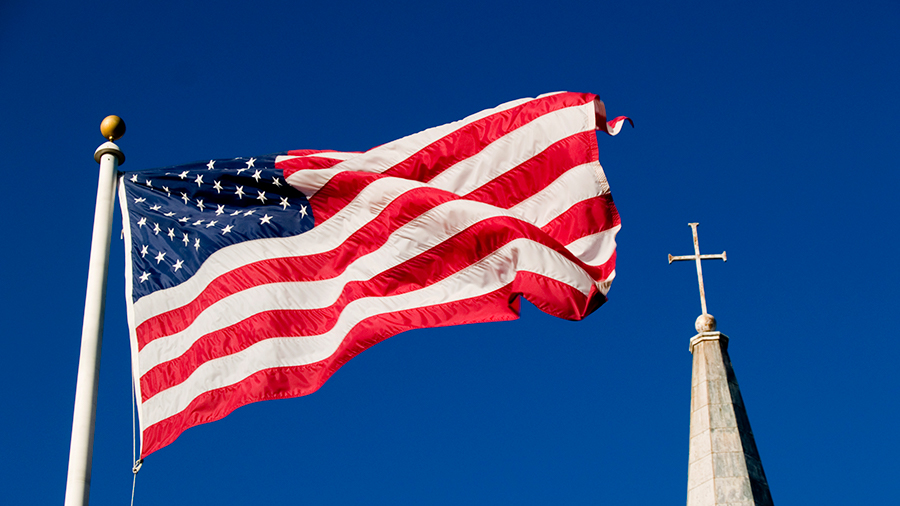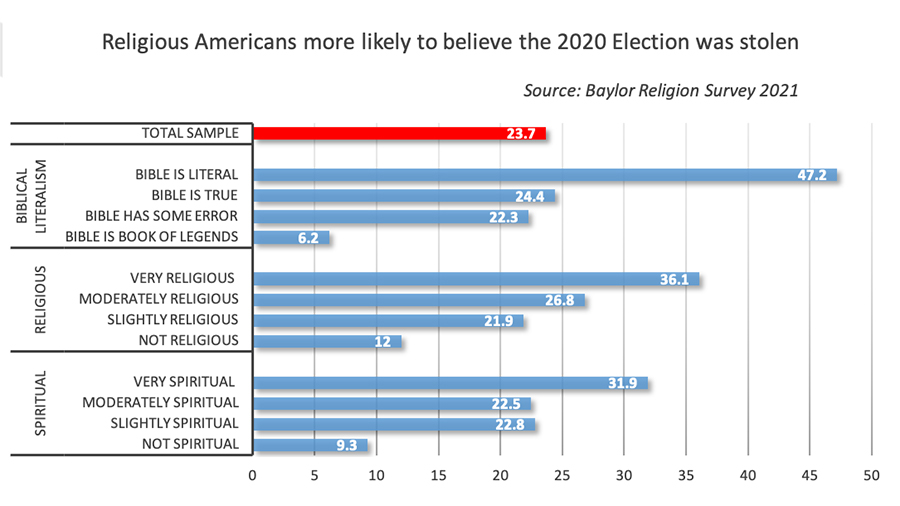Religiosity and Conspiratorial Beliefs Linked in Baylor Religion Survey Findings
Americans who most strongly assert their personal religiosity are more likely to believe contemporary falsehoods, Baylor sociologists find
Media Contact: Kaitlyn Rieper, Baylor University Media and Public Relations, 254-405-9110 Follow us on Twitter: @BaylorUMediaWACO, Texas (June 9, 2021) – Patterns in American religious attitudes, behaviors and beliefs just after the 2020 presidential election and during the coronavirus pandemic are the latest focus of the Baylor Religion Survey, the most comprehensive national survey studying religion in America.
Baylor University researchers are analyzing the results of the latest survey with special attention to how American religion relates to public health, effects of the COVID pandemic, growing wealth inequality and the hyper partisanship of contemporary American politics.
The Wave 6 findings are based on a mail and web survey designed by a team of Baylor researchers and administered nationally by Gallup. The survey was conducted from Jan. 27 to March 21, 2021, and the random sampling included 1,248 adults, age 18 and older, from all 50 states and Washington, D.C.
The survey captures a unique period in American history and contains dozens of original questions concerning religion, health and politics. A comprehensive 127-page codebook presents the distributions of all survey items. In addition, the survey team’s preliminary findings indicate that religious belief, religious identity and religious participation are all positively and strongly correlated with believing in popular contemporary falsehoods. The link between religiosity and conspiratorial beliefs is, in part, correlated with political partisanship, said Paul Froese, Ph.D., director of the Baylor Religion Surveys and professor of sociology.
“This broad religion effect corresponds to a Trump effect, something we began to notice in the Wave 5 data in 2017,” Froese said. “The intersection of religion and politics makes the discrete religion effect on conspiratorial thinking hard to concisely determine, and we must note that there are lots of different types and expressions of religiosity. While Americans who most strongly assert their personal religiosity are, on average, more likely to believe these falsehoods, they still remain a minority of religious Americans overall.”
The findings indicated that Biblical literalists, self-identified “very religious” people and weekly church attenders are significantly more likely to believe that:
- The 2020 Election was rigged.
- The COVID vaccine is untrustworthy.
- Top Democrats are involved in sex-trafficking rings.
Additionally, Americans who self-identified as becoming “more religious” over the past 10 years are especially likely to believe these falsehoods, Froese said.
“Our research team is excited to dive in to all the different dimensions of how religion relates to the pandemic crisis, growing inequality and political tribalism in the United States today. Our data couldn’t have been collected at a better time,” he said.
Currently, survey researchers are looking into findings related to:
- Prayer and the 2020 election
- Christian Nationalism and its relations to the alt-right/QAnon
- Images of God and the pandemic response
- Emotions, masculinity and dealing with COVID
- Gun culture in 2021
- Perceptions of time in the time of COVID
ABOUT BAYLOR UNIVERSITY
Baylor University is a private Christian University and a nationally ranked research institution. The University provides a vibrant campus community for more than 19,000 students by blending interdisciplinary research with an international reputation for educational excellence and a faculty commitment to teaching and scholarship. Chartered in 1845 by the Republic of Texas through the efforts of Baptist pioneers, Baylor is the oldest continually operating University in Texas. Located in Waco, Baylor welcomes students from all 50 states and more than 90 countries to study a broad range of degrees among its 12 nationally recognized academic divisions.

